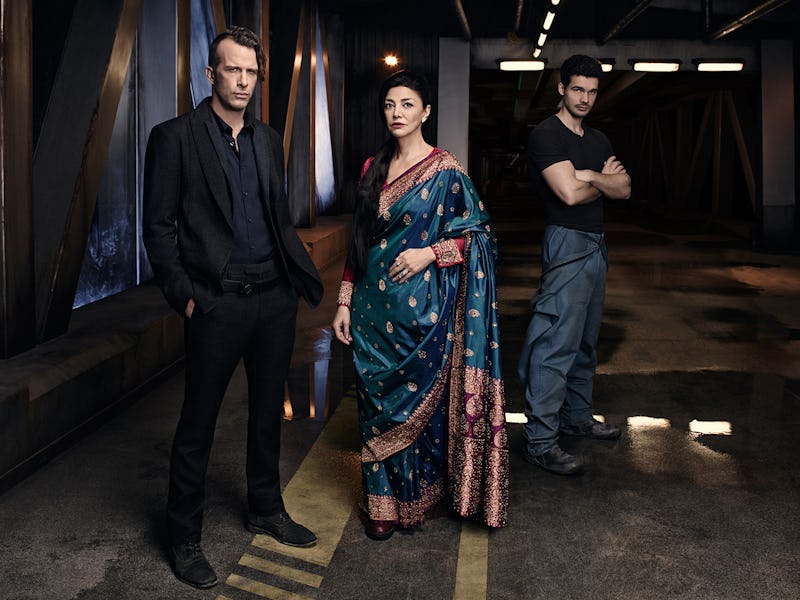Can 'The Expanse' Redefine Television Science Fiction?
It's already getting buzz as one of the best new shows of the season. But what makes The Expanse special?

Syfy’s The Expanse is already garnering buzz as the best new show of the season. Can that be right? A Syfy show? An actual sci-fi show on Syfy? Sure, the new TV season is, overall, one of the worst in recent memory — but there are reasons to get excited.
When does The Expanse air?
The Expanse is launching with a two-night premiere on December 14-15. It’s a ten-episode season, presumably extending into 2016.
It starts in mid-December? That’s weird, right?
The mid-December start date is an odd one — new, non-holiday programming is rare to see that close to Christmas. But Syfy seems to be using it to experiment with showing science fiction again. Last year, in roughly the same timeslot, the channel aired the Ascension miniseries. Starring Battlestar Galactica’s Tricia Helfer and focusing on the hard science fiction concept of a “generation ship,” Ascension served as an announcement that Syfy was back in the science fiction game, after a decade and a rebranding away from the genre that gave it its name.
This year’s December offerings are even more science fiction-y than the weakly-received Ascension. The Expanse is debuting alongside a miniseries adaptation of Arthur C. Clarke’s Childhood’s End, one of the most acclaimed science fiction novels of all time. The Expanse fits in this mode of more literary science fiction: it’s based off a novel series of the same name by James S.A. Corey (a pen name for authors Daniel Abraham and Ty Franck). The novels have been well-received; the first was nominated for both Hugo and Locus awards, two of the top awards in the genre.
So what’s The Expanse about?
The story has two main prongs. At the individual level, detective Miller (Thomas Jane) is hired to track the daughter of a wealthy businessman, Julie Mao (Florence Faivre), with the implication that her disappearance has wider ramifications for the solar system.
At the political level, The Expanse posits a future where Mars has been colonized, and the asteroid belt (“The Belt”) is actively being mined. The situation is framed as Earth being populous but poor, Mars being rich but small, and the Belt being chaotic but essential — and the whole system being on the verge of collapse or war.
What’s worth getting excited about?
First, the premise is solid. The combination of a simple genre story — the hardboiled noir — unfolding into a grand political epic is incredibly appealing. (Although the noir aspect is a bit worrisome in the advertising — Jane’s character is described as pure cliche: “Miller - and really, he just goes by his last name - is a hardened, world-weary detective. His work in the Asteroid Belt has shown him the worst sides of humanity. His new job, tracking down a missing girl, will change his life or end it.”)
It’s also oddly rare in visual science fiction to combine the two. Most science fiction, if serialized, picks one or the other — an intensely personal story like Moon or the epic, fate of humanity stuff like Babylon 5 or Battlestar Galactica. Some SF, like The Fifth Element, starts personal but merely as a quick intro for the epic story. Perhaps the best example are the Aliens, which have an intensely personal focus on Ripley while also telling the much larger story of a first contact, the Weyland-Yutani Corporation, and potentially the fate of all humanity.
The Expanse’s literary background also makes it potentially unique for visual SF in another way: a limited scope. Once into space, most visual science fiction takes off into the far corners of the galaxy, with thousands of inhabited star systems and dozens of different alien races and cultures. The middle step — local colonization of our solar system — is a common subject in written science fiction, but almost never depicted on-screen (apart from the excellent Moon).
There are causes for concern as well. Syfy hasn’t been the best shepherd of science fiction television since the days of Battlestar Galactica and budget is always a potential issue. But the reviews are really strong so far.
A lot of this is starting to sound familiar…
Why yes, dear reader who is not merely a figment of my imagination, what you’re getting at here is potential parallels with Game of Thrones. The fantasy genre, even more than science fiction, had only limited examples get on-screen. Game of Thrones, with its more political storytelling and gritty tone, based on a novel series, blew the lid off what mass audiences understood fantasy to be.
This is not to say that The Expanse is likely to be anywhere near as huge as HBO’s mega-hit. Without HBO’s marketing and financial support behind it, that’s virtually impossible. But The Expanse may give a science fiction genre that’s been in decline surge of creative energy.